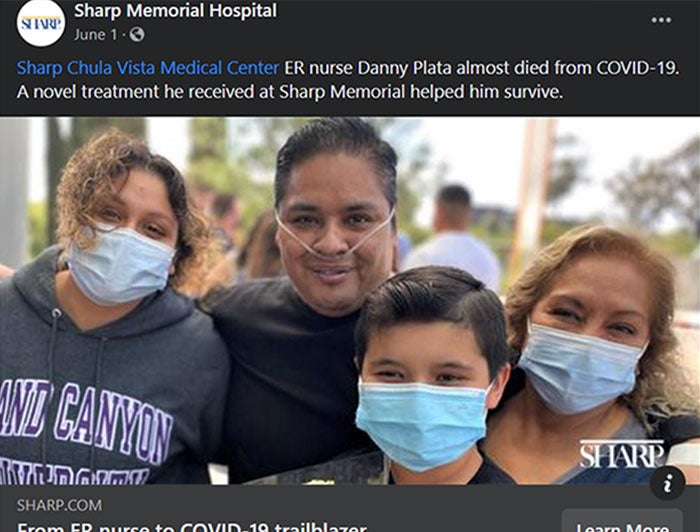COVID-19 Stories Go Viral and Encourage Vaccinations

Health care workers on the front lines of COVID-19 are sharing their stories on social media to encourage others to get vaccinated. And the stories are going viral.
In an emotional post on Facebook, Brytney Cobia, M.D., a hospitalist at Grandview Medical Center in Birmingham, Alabama, said, “I've made a LOT of progress encouraging people to get vaccinated lately!!! Do you want to know how? I'm admitting young healthy people to the hospital with very serious COVID infections. One of the last things they do before they're intubated is beg me for the vaccine…. but it’s too late. … I hug their family members, and I tell them the best way to honor their loved one is to go get vaccinated and encourage everyone they know to do the same.”
Danny Plata, an emergency department nurse at Sharp Chula Vista Medical Center in San Diego, who contracted COVID-19 between his first and second vaccine doses, shared his story through social media in hopes of persuading others to get vaccinated. He was in the hospital for three months, 41 of those days were spent in a coma. He has had to relearn how to walk and breathe on his own again.
In an interview with the NBC news affiliate in San Diego, Plata admitted, “If I wouldn’t have had that shot, I probably would have died. It definitely helped out with my outcome.”
A 2020 nationwide COVID-19 information campaign on Facebook found that “short messages from physicians and nurses had a significant impact on decreasing COVID-19 infection rates.” Reaching nearly 30 million Facebook users during the holiday season last year when COVID-19 cases were rising, social media proved to be a compelling and cost-effective way to slow the spread of the virus and inspire positive behavior changes.
The study was led by a research team that included academics from MIT, Harvard University, Massachusetts General Hospital, Online Care Group, Stanford University, Ludwig Maximilian University of Munich, Bozeman Health Deaconess Hospital, Yale University, Lynn Community Health Center, Johns Hopkins University, St. Anthony North Family Medicine, Paris School of Economics, and McGovern Medical School at the University of Texas.
The research findings underscore the power of social media as a communications tool for improving public health. According to that report, nearly 70% of Americans use Facebook, and about 36% say they use social media as a primary source of news.
The report also suggests that social media can play a role in preventing the spread of future pandemics and overcoming vaccine hesitancy. More research is underway to continue to assess the health care impacts of social media and ways to continue to use it to encourage more people to get vaccinated.

